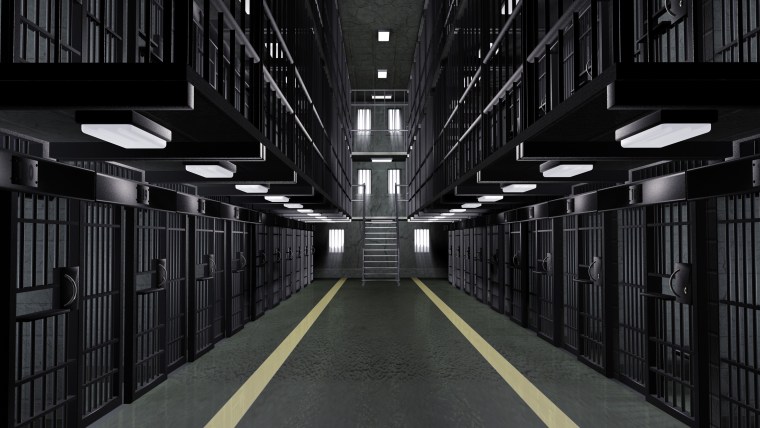Sexual minorities -- particularly lesbians and bisexual women -- are disproportionately incarcerated in the U.S., according to a recent study published in the American Journal of Public Health. The findings, which looked at data from the National Inmate Survey (2011-2012), also found lesbians, gay men and bisexuals are at an increased risk for sexual assault and more likely to receive certain types of punishment.
“Sexual minority inmates have very different experiences behind bars … but we haven’t ever had really solid data to back it up," Lara Stemple, one of the study's authors and the director of the Health and Human Rights Law Project at UCLA, told NBC Out.
This new study is the first of its kind at the national level to accurately measure the percentage of sexual minorities who are incarcerated, analyzing data from more than 80,000 respondents. The report defines “sexual minority” as anyone identifying as lesbian, gay or bisexual, as well as anyone that reported same-sex sexual behavior prior to being incarcerated.
Overrepresentation
Lesbians, gay men and bisexuals are three times more likely to be incarcerated than their heterosexual counterparts, according to the study.
Gay and bisexual men constitute 5.5 percent and 3.3 percent of those in prisons and jails, respectively. This is somewhat higher than the estimated 3.6 percent of gay and bisexual men in the U.S. population. Men who have had sex with another man prior to incarceration -- but who do not identify as gay or bisexual -- make up an additional 3.8 percent and 2.9 percent of the male population in prisons and jails, respectively.
For women, the overrepresentation is much more pronounced: Researchers found roughly a third of incarcerated women identify as lesbian or bisexual, "a proportion that is about 8 to 10 times greater than the 3.4 percent of lesbian or bisexual women in the U.S. population." When women who engaged in same-sex sexual activity prior to their detention are factored in, sexual minority women account for a staggering 42.1 percent of the female prison population and 35.7 percent of women in jails.
Stemple called the number of incarcerated sexual minority women “overwhelming.” She said this means no one “should be doing any work on incarcerated women from this point forward without thinking about how [it] affects sexual minorities.”
Limitations of the data make it impossible to speak definitively about the cause of this overrepresentation, according to Stemple. However, she noted, “Thinking about gender theory, women who defy norms of femininity may be more likely to be perceived as aggressive and dangerous.”
Stemple also said it is important to take race into account, given the disproportionate number of people of color who are incarcerated.
“Societal perception of masculinities of color as threatening could apply to women. There is already good evidence that it applies to men,” she said, adding that the overrepresentation of sexual minority women may be connected to “the over-policing of masculinities of color.”
Victimization, Abuse and Punishment
The study also found that sexual minorities, both male and female, were more likely to have suffered sexual victimization prior to incarceration than heterosexual inmates. Once incarcerated, they are again at increased risk. Among male inmates, sexual minorities were much more likely to be sexually victimized by staff and other inmates than heterosexual male prisoners. Sexual minority women were also at increased risk of sexual assault in prison compared to straight women.
Researchers reported that sexual minorities “were significantly more likely to have experienced administrative or punitive segregation than were straight inmates.” These punishments, which include solitary confinement, have severe negative effect on prisoners’ wellbeing and are “related to adverse health and mental health outcomes," the study found.
Next Steps
The study does not discuss the situation of transgender prisoners. According to Stemple, this is because the “survey instruments were not good enough to provide definitive data.” What is known about transgender experience in prison is that trans prisoners are at “very, very high risk” for abuse and assault. Stemple said the Bureau of Justice Statistics, which conducted the survey, should alter it in the future to be able to accurately track the number of trans people who are incarcerated.
Moving forward, Stemple hopes that the study’s findings influence the implementation of the National Standards to Prevent, Detect, and Respond to Prison Rape (PREA). “We want the PREA, as they roll out the standards, to take into account the unique needs of this population.”
